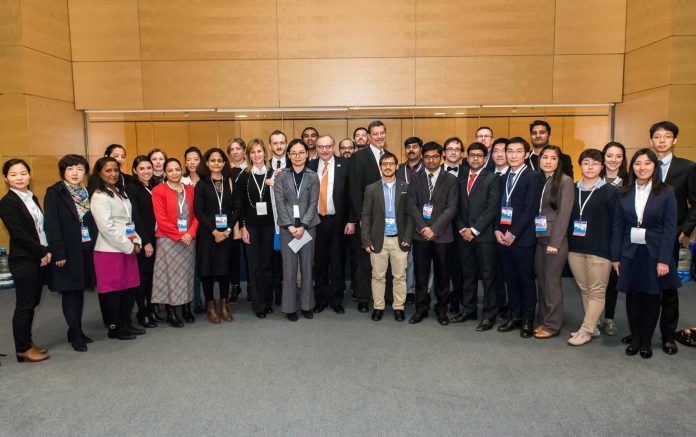Posted: April 2017
By Keightley Amen, BA, ELS
To help ensure that high-quality thoracic oncology care is available throughout the world and well into the future, the IASLC offers an International Mentorship Program to support early-career physicians and researchers from economically developing countries. The competitive program provides each winner with a full scholarship to the IASLC 17th World Conference on Lung Cancer (WCLC), it matches each mentee with a well-established scientific or clinical mentor, and it arranges a weeklong visit at the mentor’s institution, including coverage of all expenses.
Since the program’s inception in 2013 with one mentee, 44 young thoracic specialists from 18 countries have participated. The program helps awardees develop their careers, learn new skills and treatments, experience an established department in action, and establish collaborative relationships— then bring the new information and ideas back to their home institutions.
Previous awardees lauded the opportunity to learn from experts about a wide array of topics, including immunotherapy, molecular testing, pathology, rare patient cases, subspecialization, imaging, personalized medicine, and the importance of multidisciplinary teamwork; many mentees also gleaned precious advice on their own specific areas of research and practice.
In a recent anonymous survey, one respondent described the meaningful impact of coming from an area that has little oncology infrastructure to see how an established program runs: “I have just started my new career as the first medical oncologist in my hometown. Everything in my hospital is new. When I went to my mentor’s institution, I got lots of ideas to improve my oncology unit and team. I saw strong oncology teams, the importance of networking, the system of cancer research, and I saw what experts do in practice. All of these experiences make me really want to make something better.” IASLC’s international perspective was a key to the program’s success: “It is really interesting to see the way things are done elsewhere in the world. The US standard of care is not the same as the European standard or the Mexican standard. Now I realize how lucky I am to have the view from different parts of the world.”
In a personal letter to IASLC, one participant marveled at how much knowledge could be fit into a short time. Chunxia Su, from Shanghai Pulmonary Hospital and Tongji University School of Medicine in China, met with a mentor throughout the 17th WCLC in Vienna, then was immersed at the mentor’s institution in London, United Kingdom. “My schedule was quite full and busy. I received training lectures, participated in clinic with my mentor, attended lung cancer multidisciplinary meetings, as well as one-on-one meetings with my mentor. I also attended meetings in London on lung cancer prevention. There were patient review meetings, journal club and research meetings. My head was buzzing. This was a great opportunity to learn from my mentor and other outstanding lung cancer oncologists, and the process started on the very first day.”
The two shared meals and walked many miles among the famous landmarks of London, all while discussing oncology, how to design a successful clinical trial, the most vital details related to inclusion and exclusion criteria, how to give interesting and informative lectures, and how to write high-quality papers, Su said.
Mentors and mentees responding to the survey reflected on the long-term effects the program would have after the return trip home:
Said a mentee: “Winning the IASLC mentorship award will impact my career. … My mentor and I are planning to establish collaboration both in basic and clinical research. … We will get in touch with each other and look for potential collaborations in the future.”
A program mentor echoed the hope for future collaboration: “It was my pleasure to be a mentor for the IASLC program and to host an intelligent and warm-hearted mentee who proved to be a very skilled pathologist and researcher. I have much enjoyed our discussions on difficult pathology cases, molecular pathology, and lung cancer research, and I believe the two weeks together formed a base for future collaborations and friendship.”
Participants and IASLC believe the program will affect not only individual careers, but the entire field. “Interaction with the scholars enriches you with newer thoughts and ideas for future collaborative research in thoracic oncology,” answered one mentee. “I sincerely believe that such kind of collaborative research is necessary for eradication of lung cancer.” ➲
For further information about IASLC International Mentorship Program, email the IASLC at [email protected]. ✦











